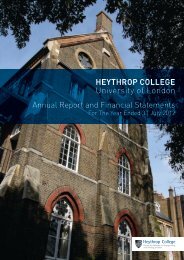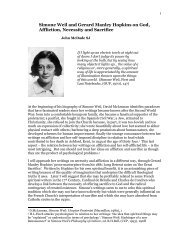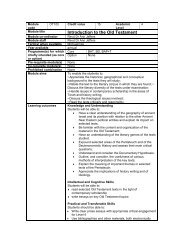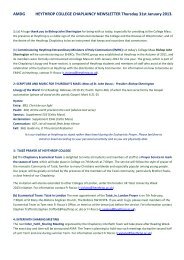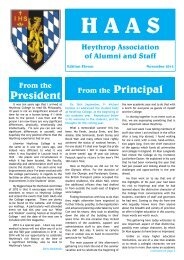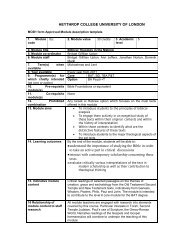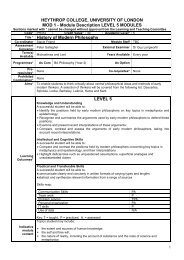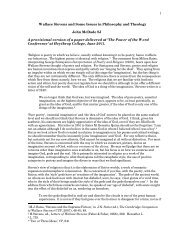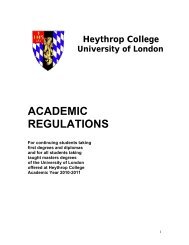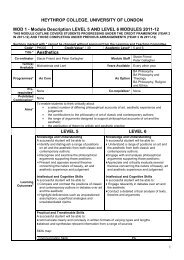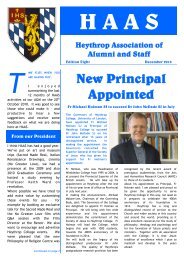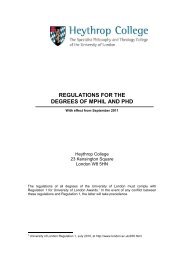Von Balthasar and the Office of Peter in the Church
Von Balthasar and the Office of Peter in the Church
Von Balthasar and the Office of Peter in the Church
Create successful ePaper yourself
Turn your PDF publications into a flip-book with our unique Google optimized e-Paper software.
14<br />
servant‟ relationship <strong>in</strong> <strong>the</strong> <strong>Church</strong> <strong>in</strong>compatible with <strong>the</strong> Christian concept <strong>of</strong><br />
a self-giv<strong>in</strong>g God:<br />
You [Romans] always imag<strong>in</strong>e that God created men to rule over <strong>the</strong>m <strong>and</strong><br />
to assert his rights as sovereign. You see God as a k<strong>in</strong>d <strong>of</strong> potentate, <strong>and</strong><br />
<strong>the</strong>n you pass yourselves <strong>of</strong>f as be<strong>in</strong>g delegated by him to implement his<br />
power <strong>and</strong> reign. Thus you st<strong>and</strong> <strong>the</strong> Gospel on its head. (263)<br />
A strong attack, <strong>of</strong> course, <strong>in</strong> <strong>the</strong> best tradition <strong>of</strong> protest aga<strong>in</strong>st Roman<br />
dom<strong>in</strong>eer<strong>in</strong>g. For Laberthonnière, <strong>the</strong> <strong>Church</strong> can be only „“a unity through<br />
communio” <strong>of</strong> free persons who, by <strong>the</strong>ir freely willed love, are moved to build<br />
a unified <strong>Church</strong>‟ (262). Christian authority, he says, can never <strong>in</strong>struct „from<br />
outside‟, nor can <strong>the</strong> truth be imposed; nor should <strong>the</strong> Christian submit<br />
himself to be led <strong>and</strong> <strong>in</strong>structed purely passively (263). He denounces those<br />
<strong>in</strong> authority who withdraw <strong>in</strong>to „proud self-sufficiency‟ <strong>and</strong> boast that it „only<br />
has to wait for o<strong>the</strong>rs to come‟ to <strong>the</strong>m, for <strong>the</strong>n <strong>the</strong> conduct <strong>of</strong> authority <strong>in</strong><br />
<strong>the</strong> <strong>Church</strong> splits <strong>in</strong>to, on <strong>the</strong> one h<strong>and</strong>, „authoritarianism <strong>and</strong> <strong>the</strong> lust for<br />
power‟, <strong>and</strong> on <strong>the</strong> o<strong>the</strong>r, <strong>in</strong>to a servility filled with „ambitious grovell<strong>in</strong>g‟.<br />
He is clear that <strong>the</strong> solution to <strong>the</strong> exercise <strong>of</strong> authority <strong>in</strong> <strong>the</strong> <strong>Church</strong> cannot<br />
be one-sided. There is simply no po<strong>in</strong>t <strong>in</strong> constantly dem<strong>and</strong><strong>in</strong>g that those <strong>in</strong><br />
authority behave better, if those under authority do not change at <strong>the</strong> same<br />
time: <strong>the</strong> responsibility for mak<strong>in</strong>g <strong>Church</strong> authority au<strong>the</strong>ntically Christian is<br />
shared by all. Laberthonnière asks two penetrat<strong>in</strong>g questions, <strong>and</strong> <strong>the</strong>n asks a<br />
third as a way <strong>of</strong> clarify<strong>in</strong>g <strong>the</strong> po<strong>in</strong>t <strong>of</strong> <strong>the</strong> second question:<br />
In what spirit <strong>and</strong> <strong>in</strong> what manner should leadership <strong>and</strong> <strong>in</strong>struction be<br />
given, to be truly human <strong>and</strong> Christian And, <strong>in</strong> turn, how should a person<br />
who is progress<strong>in</strong>g <strong>in</strong> faith prepare himself to receive guidance <strong>and</strong><br />
<strong>in</strong>struction... How should people like us [who have not been given<br />
authority] act, so that, spiritually deepened by <strong>the</strong> acceptance <strong>of</strong> authority,<br />
we can contribute to <strong>the</strong> spiritual deepen<strong>in</strong>g <strong>of</strong> authority itself” (262)<br />
I cannot prescribe what <strong>the</strong> answers to Laberthonnière‟s questions should be,<br />
s<strong>in</strong>ce <strong>the</strong>y bear upon each Catholic‟s core <strong>of</strong> spiritual responsibility: Lev<strong>in</strong>as‟<br />
aphorism, „responsibility cannot be preached, only borne‟, is exactly right<br />
here. But some comments are required: Laberthonnière‟s third question<br />
looks for a dimension <strong>of</strong> spiritual deepen<strong>in</strong>g <strong>in</strong> <strong>the</strong> acceptance <strong>of</strong> authority<br />
which will br<strong>in</strong>g about an analogous deepen<strong>in</strong>g <strong>in</strong> <strong>the</strong> exercise <strong>of</strong> authority, a<br />
relationship <strong>of</strong> reciprocity <strong>and</strong> mutuality <strong>in</strong> which, by my acceptance <strong>of</strong><br />
authority, <strong>the</strong> conditions are created for authority <strong>in</strong> <strong>the</strong> <strong>Church</strong> to be<br />
exercised <strong>in</strong> a fruitful way. I have a spiritual responsibility <strong>in</strong> this regard<br />
which comes from my sense that salvation is mediated to me through this<br />
mysterium, that <strong>in</strong> its direction <strong>and</strong> guidance I encounter a claim on my<br />
obedience grounded <strong>in</strong> Christ‟s authority <strong>and</strong> my obedience to him. 6 This<br />
6 Can we ignore <strong>the</strong> spirituality <strong>of</strong> obedience developed particularly <strong>in</strong> <strong>the</strong> religious orders<br />
which speak about an ‘obedience <strong>of</strong> will <strong>and</strong> <strong>in</strong>tellect’ <strong>in</strong> response to <strong>the</strong> exercise <strong>of</strong> authority<br />
The <strong>the</strong>me is obviously an expression <strong>of</strong> a particular charism, but it elucidates someth<strong>in</strong>g<br />
fundamental <strong>in</strong> Christian life: a ‘de-centr<strong>in</strong>g’ <strong>of</strong> <strong>the</strong> self <strong>in</strong> faithful membership <strong>of</strong> <strong>the</strong> Body <strong>of</strong><br />
Christ. How much <strong>of</strong> <strong>the</strong> resistance to authority comes from a view <strong>of</strong> <strong>the</strong> ‘autonomous self’,<br />
which regards obligations to authority <strong>and</strong> claims on obedience as <strong>in</strong>trusive impositions which<br />
must be discarded for <strong>the</strong> self to be free



